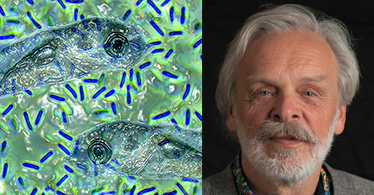
Next Tuesday 3 July 12:00 am at Seminar room ICBiBE - SS6 (lower-ground floor, institutes building), Dr. Olav Vadstein (NTNU Norwegian University of Science and Technology) will give a Seminar on "Using ecological theory to promote mutualistic host-microbe relationships: An example from aquaculture"
SEMINAR(i): Ecology and mutualistic host-microbe relationships
WHO?: Dr. Olav Vadstein (NTNU Norwegian University of Science and Technology)
WHAT?: Using ecological theory to promote mutualistic host-microbe relationships: An example from aquaculture
WHEN?: Tuesday 03/07/2018 – 12:00 am
WHERE?: Seminar room ICBiBE - SS6 (Institutes building floor -1)
ABSTRACT:
Many people connect Ecology to structure and function of natural ecosystems. However humans administrate a large number of unnatural ecosystems, e.g. sewage treatment plants, with natural organisms. Until now these systems have been managed mainly with an engineering approach, but the ecological perspective is getting more attention and resulted in environmental biotechnology as a field . I will use aquaculture of marine fish larvae as a case to use ecological theory to 1) do an analysis of the reason for low viability of larvae in aquaculture, and 2) propose and test a strategy to solve the problems. It turns out that current rearing technology selects for r-strategist bacteria, and that these opportunist cause infections resulting in poor appetite and gut dysbiosis. To solve the problem two methods for community level K-selection were hypothesized. Experiments show that K-selection creates different bacterial community composition in the water, which results in significantly different gut microbiota of the larvae. Moreover, larvae reared in water with K-strategist bacteria have better appetite, have an earlier onset of growth, and higher survival at metamorphosis. The effect sizes are not only statistically significant, but also highly significant at the practical level. The presented experiments show that it is possible to control the composition of the microbes at the community level by directional selection, and that ecological theory can be used to solve practical problems.
Llista d'enllaços:












